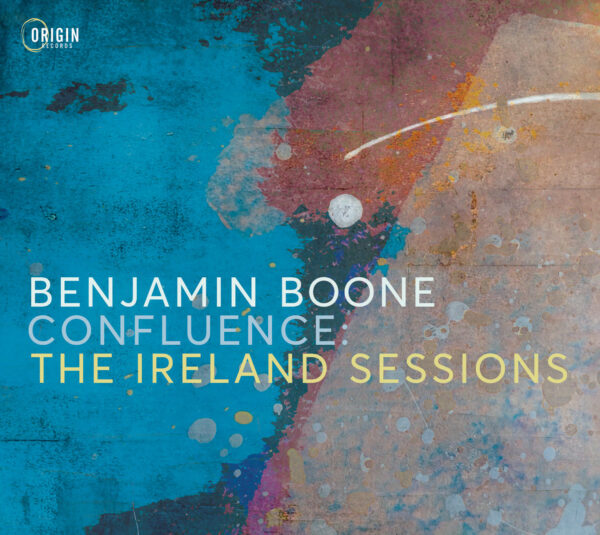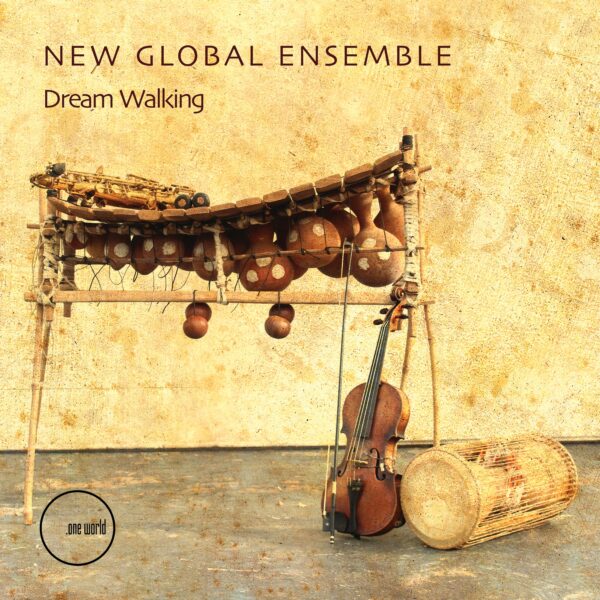Description
“Boone’s colleagues… prove to be polyglot performers equally conversant in the languages of funk, post-bop, swing and, of course, African forms… creat[ing] an amalgam that draws from those various traditions and ideals but remains fastened to none of them. The morphing opener, ‘The Intricacies of Alice,’ makes that point better than any song on the album. Shifting gears with incredible precision while also keeping a fixed eye on melodic clarity, it gives pause to admire the handiwork of the well-oiled rhythm section. A soaring, punchy ‘Maiden Voyage’ follows. Boone, sounding like a man possessed, brings the heat, and Ayisa and Dey, in smart contrast, play things on the somewhat sly side… ‘Slam,’ with Huson’s wordless incantations, seems to play to ancient rites and modern-day strife all at once; ‘Curtain of Light’ brings Ethiopian expressionism into the band’s orbit; ‘The 233 Jazz Bar,’ nodding to the venue where these musicians connected, plays to the region’s funkier side; and the Gerry Niewood–penned title track, with Boone gleefully riding the currents, encapsulates the titular spirit.” Dan Bilawsky, All About Jazz
Saxophonist-composer Benjamin Boone’s The Poetry of Jazz, a visionary collaboration with U.S. Poet Laureate Philip Levine, was praised in leading musical and literary publications, featured on NPR’s All Things Considered, and voted the #3 Best Album of 2018 in DownBeat’s 83rd annual Readers Poll. Boone documents an equally compelling collaboration, this time from his year as a U.S. Fulbright Scholar in Ghana, on his newest project Joy, set for a March 20th release on Origin Records.
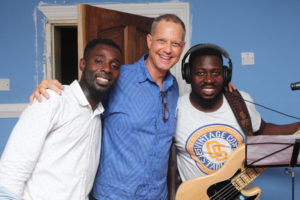
This album, his fifth under his own name, places Boone amongst an Accra-based cohort of Ghanaian jazz musicians known as the Ghana Jazz Collective. Tenor saxophonist Bernard Ayisa, pianist Victor Dey, Jr., bassist Bright Osei, and drummer Frank Kissi join Boone (with further assistance on some tracks from vocalist Sandra Huson) on four of his originals, a reimagining of the classic “Maiden Voyage,” and intriguing covers of two lesser-known jazz compositions.
Though created in a country some five thousand miles away, Joy is not out of the realm of a traditional jazz album. The polyrhythms that underpin the music are West African in origin, but nonetheless recognizable to fans of funk, R&B, and postmodern jazz. Nobody was more surprised than Boone, who had come to Ghana to study its musical traditions, when he was invited to sit in with the band at Accra’s +233 Jazz Bar & Grill. “I was expecting to hear something like Ethiojazz or Hugh Masekela,” he recalls, “But these guys know American jazz inside and out, and play the heck out of it – but with a definite Ghanaian twist.”
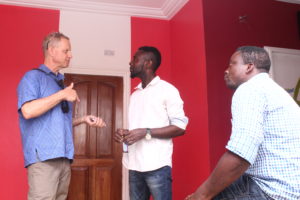
More to the point, all of the musicians speak the international language of groove. It’s as potent on Boone’s slithery head-bobber “The 233 Jazz Bar” as it is on his aggressive, shapeshifting “The Intricacies of Alice,” or his Hiromi Uehara-inspired “Slam,” or his punchy arrangement (with Dey) of Herbie Hancock’s “Maiden Voyage.” Even the longing ballad “Without You,” a feature for Huson, offers the entrancing and danceable beat of an R&B slow jam. “Music and dance are inseparable in Ghana,” says Boone. “In traditional music, if you don’t know the dance, it is almost impossible to play the music. The grooves are incredibly tight.”
Nevertheless, distinctly African influences do make themselves known. For example, while the title track “Joy” was written by the late American saxophonist/flutist Gerry Niewood, Boone and Dey’s arrangement addresses the melody with West African cadences and emphasizes the interlocking rhythms within its basic waltz pulse. With “Curtain of Light,” the band reaches across the continent toward the Ethiopian musical context of composer Jonovan Cooper (who teaches jazz at Addis Ababa University, where Boone was also in residence). Based on an ancient Ethiopian mode, “Curtain of Light” reaches several almost religiously ecstatic climaxes.

Where the spirit of Ghana truly manifests, however, is in the camaraderie of its musicians and the palpable joy that fulfills the promise of the album’s title. “In Ghana, music is participatory, egoless, and woven into the very fabric of existence,” says Boone. “People live with joy and make music with joy.”
Boone has garnered 18 national/international awards and honors for his music, which appear on 28 albums and have been performed in 36 countries at venues such as Carnegie Hall and the Kennedy Center. As a Professor at California State University Fresno, he has won the campus’ highest awards for teaching, service, and creative activity. In addition to serving as a U.S. Fulbright Scholar to Ghana, Boone served as a U.S. Fulbright Senior Specialist to the Republic of Moldova in 2005.
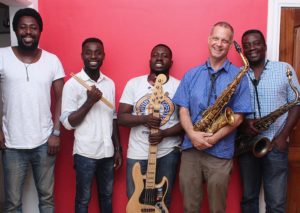
The U.S. Fulbright program seeks to build bridges to peoples across the globe. Taking this role seriously, Boone instigated the ‘First Annual Ghana National Jazz Workshop Tour,’ where he and The Ghana Jazz Collective performed and led workshops on improvisation and how jazz is an embodiment of the historic link between the peoples of the U.S. and Ghana. “I saw firsthand the power of music as diplomacy,” says Boone. “I hope Joy shines a positive light on Ghana, its historic connection to the U.S., and to the tremendous jazz musicians there. Ghanaians have a love of life, a love of peace, and a culture of welcoming. What a joyous way to live and to make music.”
MORE about this album……
When he moved to Ghana, saxophonist/composer Benjamin Boone never expected he would join a quartet of stellar jazz musicians; he figured he would be a student of the West African nation’s rich array of traditional music. Turns out, he did both.
On sabbatical from his day gig as a professor at California State University Fresno, Boone’s yearlong fellowship as a U.S. Fulbright Scholar yielded plenty of opportunities to learn various Ghanaian styles. But he also connected with a cadre of brilliant Accra-based jazz musicians eager to embrace an American colleague.
During his last week in Ghana, Boone gathered these jazz compatriots together in a sweltering Accra studio to document the new friendships, resulting in an arrestingly beautiful album aptly titled Joy. The project showcases a cosmopolitan cast of artists who perform as the Ghana Jazz Collective. The ensemble includes tenor saxophonist Bernard Ayisa, pianist Victor Dey Jr., bassist Bright Osei, and drummer Frank Kissi. While laced with unmistakably West African polyrhythms, the music wouldn’t sound out of place in Manhattan, Los Angeles, or London, encompassing funk, fusion, R&B, and post-bop idioms.
“I was expecting to hear something like Ethiojazz or Hugh Masekela,” Boone says. “But with the music these guys are playing in Accra you could almost be in New York. They know American jazz as well as any American jazz musician.”
Boone has garnered remarkable attention in recent years for two critically acclaimed albums featuring his compositions written to accompany recitation by Pulitzer Prize–winning poet Philip Levine. Boone was in Ghana, doing interviews with national media outlets via sketchy cell phone connections, when the first of these two albums came out, 2018’s The Poetry of Jazz (followed by 2019’s The Poetry of Jazz, Vol. 2), widely recognized as a milestone poetry/jazz project. Praised in leading musical and literary publications, voted the #3 “Best Album of 2018” in DownBeat Magazine’s annual Readers Poll (just behind Chick Corea and Wynton Marsalis), featured on NPR’s All Things Considered, referenced by Terry Gross on Fresh Air, and an Editor’s Pick in The Paris Review, The Poetry of Jazz volumes 1 & 2 established Boone as one of the most compelling voices exploring the intersections between poetry and jazz.
Joy also focuses on his original compositions, starting with the surging opener “The Intricacies of Alice,” a multifaceted portrait of the composer’s wife that builds to a dazzlingly syncopated conclusion that Boone credits to Dey: “Victor came up with the shifting rhythm at the end. Ghanaians displace melodic and rhythmic figures with abandon and precision.” He adds, “Alice can be a number of things at once, wickedly sardonic and funny while at the same time full of empathy. The band thinks this tune is a hoot, alternating between three different grooves and two meters, because they know her, and know it fits,” he says.
“Slam” is another rhythmic steeplechase, alternating between 5/4 and 6/4. With the emphatic wordless vocals of Sandra Huson, the tune feels like an early fusion experiment inspired by an ecstatic ritual. Boone offers a slinky tribute to the venue where he regularly joined his Ghanaian collaborators in the house jazz band, “The 233 Jazz Bar,” named after Ghana’s country code “+233.” With Boone’s sinuous alto gliding through the unadulterated West African funk, the tune vividly evokes the club’s celebratory vibe.
“Curtain of Light,” based on an ancient Ethiopian mode, was introduced to Boone in Ethiopia by Jonovan Cooper, a U.S. expat who leads Addis Ababa University’s jazz program. “This tune sounds primal, yet it’s very fresh, and almost spiritually euphoric. We build to an incredibly ecstatic climax at the end,” says Boone.
Huson delivers Boone’s R&B power ballad “Without You” with complete authority, rendering the lovesick lament with such gospel-powered conviction it sounds like a forgotten hit from 1999. She’s also the x factor on Boone and Dey’s reharmonization of Herbie Hancock’s “Maiden Voyage,” providing wordless vocal lines that add a luminous texture to the theme. Osei’s infectiously bouncing bass line culminates in a vamp that seems to stretch to the horizon.
Huson’s presence on the album is the most conspicuous mark of the communal sensibility that suffused the sessions. “Her voice came in my head when I wrote the words to ‘Without You.’ Just before she recorded it, I saw her sitting there with her two daughters and it hit me that she would sound great on ‘Maiden Voyage’ and ‘Slam,’ too. It was totally spontaneous.”
The album closes with the title track, a rapturous tune by the late saxophonist Gerry Niewood arranged by Boone and Dey. Its open-hearted theme seemed to Boone to embody the Ghanaian practice known as akwaaba, an Akan term that translates literally as “welcome” but encompasses a sense of hospitality, acceptance, friendliness, and cooperation.
In this spirit, Boone was immediately urged to sit in with his Ghanaian collaborators when he showed up at the +233 Jazz Bar. “In Ghana, music is participatory, communal, egoless, and woven into the very fabric of existence,” says Boone. “It is a beautiful way to live and make music.” Pianist Victor Dey Jr., the son of a Ghanaian diplomat, grew up in the U.K., Algeria, and later in Ghana. He studied at Berklee College of Music in 2006 before returning to Ghana, his base of operations for performances across Europe, West Africa, and the Middle East. Awarded “Musician of the Year” at the 2014 Vodafone Ghana Music Awards, he’s performed with masters such as Stevie Wonder, Courtney Pine, Hugh Masekela, and Ghanaian highlife innovator Gyedu-Blay Ambolley.
Ghanaian-born saxophonist Bernard Ayisa got his start on the Johannesburg jazz scene after studies with Darius Brubeck and Dustan Cox. He works regularly with Iraqi guitarist, singer, and composer Ilham al-Madfai, whose synthesis of Western guitar stylings with traditional Iraqi music has earned a vast popular following across the Middle East. Frank Kissi is the first-call drummer in Ghana and winner of the 2014 Vodafone Ghana Music Awards Instrumentalist of the Year trophy. When he’s not playing with Ayisa-Dey Band he can be found leading his own Electric Band or performing regularly with the soul-steeped Black Lace Band. And bassist Bright Osei has performed and recorded with leading Ghanaian musicians such as the prolific Afropop/reggae singer Kojo Antwi, gospel artist Ofie Kodjoe, highlife star Daddy Lumba, and R&B vocalist Ofori Amponsah.
Heralded in both jazz and new music circles, Benjamin Boone’s music has garnered 18 national and international awards and honors, has been performed in 35 countries, and has appeared on 28 albums. It’s been featured in film and has been the subject of multiple national broadcasts on National Public Radio. Born October 19,1963 in Statesville, North Carolina, he studied jazz at the University of Tennesesee and went on to get a Master of Music degree in composition from Boston University and a Doctorate degree in composition from the University of South Carolina. For his doctoral dissertation, Boone delved into the little-studied area of speech from a musical perspective, research cited in Oxford’s New Grove Dictionary of Music and Musicians and the Journal of the Acoustical Society of America. During his first stint as a Fulbright Senior Specialist Fellow, he conducted musical research in the former Soviet republic of Moldova.
With all of his experience at home and abroad, Boone was still surprised by the effect the turmoil in Washington, DC was having in Ghana, especially after the president denigrated immigrants and developing nations with a vulgar term.
“In January 2018, while I was in Ghana, the president referred to Africans and Haitians as being from ‘shithole countries.’ That week a taxi driver asked where I was from and when I said I’m from the U.S., he got a serious look on his face and whispered, ‘We have been through this, too. It will pass and be okay.’ That really woke me up. And it made our work harder.”
The Fulbright program, a division of the U.S. Department of State, was begun after World War II in order to avert war by establishing and keeping connections with peoples across the globe. Taking this role seriously, Boone persuaded the U.S. Embassy and U.S. Department of State to fund the ‘First Annual Ghana National Jazz Workshop Tour.’ Boone and his +233 Jazz Bar partners performed and led workshops across Ghana on improvisation, jazz history, and how jazz is an embodiment of the historic link between the peoples of the U.S. and Ghana. “I saw firsthand the power of diplomacy, and of music as diplomacy,” says Boone.
The administration’s policies still adversely affect Ghanaians. “Visas for Ghanaians are being denied, when it should be easy for these incredible musicians to come the U.S. and share their talents,” Boone says. “One University of Ghana colleague was even turned around at the Atlanta airport even though he had a visa to perform at a music festival. I tried to find out why, but got no answers. So when I returned to the U.S. I hosted a fundraiser to hire a lawyer to fight it in court.”
Boone says, “Ghana is full of amazing people with a beautifully communal culture and they can play the hell out of American jazz. I hope this album shines a light on how cool Ghana is, and what tremendous musicians are there. And I can think of no better word that describes Ghanaians than ‘joy.’ They live with joy and make music with joy. I miss that tremendously.”
An artist devoted to breaking down walls, Boone is a happy warrior, and Joy captures the saxophonist-composer in his element, communing with far-flung friends by adding a new page to jazz’s international purview.


